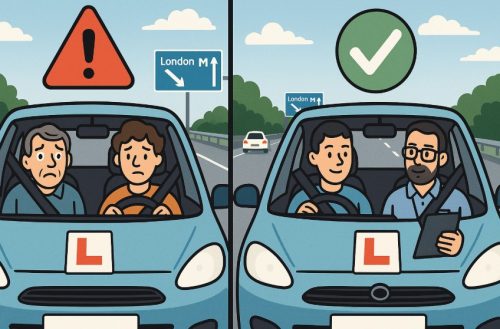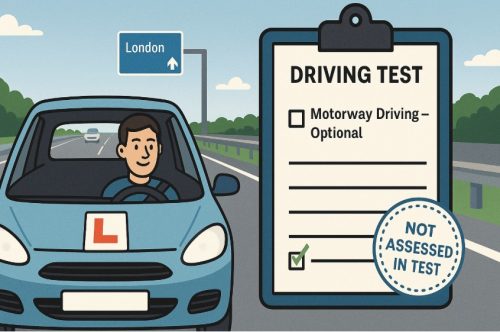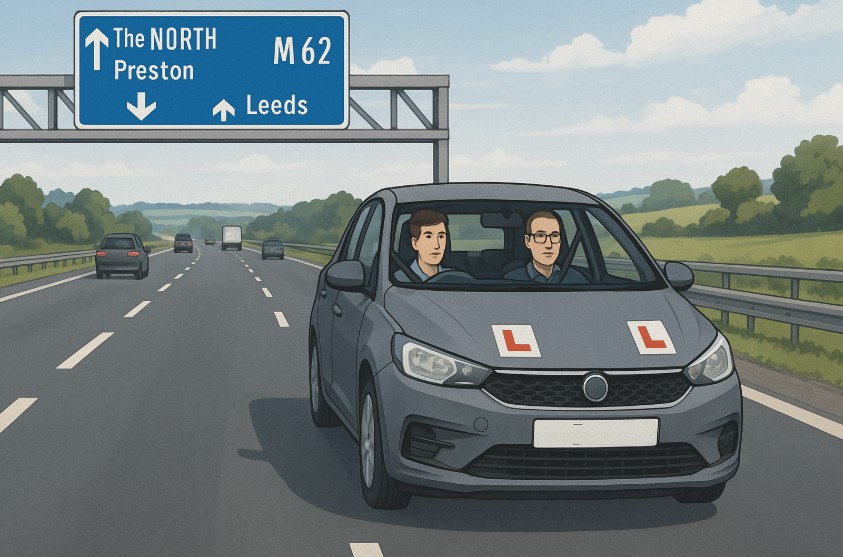Table of Contents
Since 2018, learner drivers in the UK have been permitted to take driving lessons on motorways—but only under specific conditions.
While this rule aims to enhance road safety and driver confidence, it comes with strict requirements learners must follow. From needing a DVSA-approved instructor to using a dual-control car with L-plates, learners must be correctly prepared.
This blog explores everything you need to know about motorway driving as a learner, from legal rules to lesson benefits and insurance implications.
What Are the Legal Rules for Learners Driving on Motorways?

The law now allows learner drivers to access motorways, but there are clear and non-negotiable rules they must follow. These rules are designed to ensure safety and prevent misuse of the privilege.
A learner must always be accompanied by an Approved Driving Instructor (ADI)m, someone fully qualified and registered to teach. They cannot go on the motorway with a parent or friend, no matter how experienced the accompanying driver is.
Additionally, the car must be fitted with dual controls. This allows the instructor to intervene if needed. The vehicle should also display L-plates at both the front and back. Motorway lessons are voluntary and only available to learners driving cars, not motorcyclists. Importantly:
- No trainee driving instructors are allowed to supervise motorway driving.
- Lessons must be pre-approved by the ADI, based on the learner’s readiness.
These rules ensure that every motorway experience for a learner is safe and structured.
Can Learner Drivers Use the Motorway?
Yes, learner drivers can use the motorway, but not on their own. They must meet legal conditions that focus on their safety and that of others. Once these conditions are met, a learner can drive on the motorway in England, Scotland, or Wales.
These lessons offer crucial exposure to high-speed roads, helping learners develop confidence before taking to the motorways independently after passing their test.
It’s important to understand that although motorway lessons are allowed, they’re not part of the practical driving test. They are offered at the instructor’s discretion based on the learner’s confidence and performance during regular lessons.
Do Learners Need a Driving Instructor to Go on the Motorway?
Absolutely. A learner must be accompanied by a fully qualified Approved Driving Instructor (ADI) to be allowed on the motorway.
This requirement is not optional and ensures that the individual providing guidance has the experience and legal authority to manage the lesson. It also guarantees that the learner is under constant professional supervision.
This rule rules out the possibility of practising with experienced family members or friends. Even if a relative is a long-time driver with a clean record, they cannot legally accompany a learner on the motorway unless they are a certified ADI. This ensures that safety standards are met at all times.
Is It Mandatory for Learners to Take Motorway Driving Lessons?
Motorway lessons are not mandatory, and learners are not required to take them before their driving test. However, instructors may recommend them based on the learner’s location or skill level. While optional, motorway lessons are incredibly beneficial.
- They help improve confidence in high-speed conditions
- They offer exposure to different road layouts and lane systems
- They prepare learners for real-world driving scenarios
If motorway driving is likely in a learner’s future, then these lessons are a smart investment in safety and experience.
What Changed in the Law from 4th June 2018?
Before June 4th, 2018, it was illegal for learner drivers to drive on the motorway under any circumstances. That changed when the UK government amended driving regulations to allow learner motorists to gain early experience.
The update aimed to reduce accidents involving newly qualified drivers, many of whom were using motorways without prior exposure.
Under the new law, learners can now drive on motorways, but only in the presence of an ADI and in a dual-control vehicle.
This change does not apply to motorcycles and does not make motorway driving part of the driving test. It also excludes trainee instructors. The update was intended to create more confident, competent drivers.
Can Learners Practise on the Motorway with Family or Friends?

No, learners are not allowed to drive on the motorway with parents, family members, or friends, even if they’re experienced drivers.
Only a certified ADI can legally supervise a learner on the motorway, and the car must be equipped with dual controls.
Here’s a quick comparison:
| Supervising Companion | Allowed on Motorway? | Dual Control Required? |
| Approved Driving Instructor | Yes | Yes |
| Trainee Driving Instructor | No | N/A |
| Family Member or Friend | No | N/A |
This rule is strict for safety reasons. Private practice is allowed on other roads but not on motorways.
What Happens If a Learner Drives on the Motorway Illegally?
Driving on the motorway as a learner without meeting the legal requirements can lead to serious consequences. It is considered an offence and is penalised accordingly.
Penalties may include:
- A fine of up to £1,000
- Up to six penalty points on the provisional licence
- Points transferred to the full licence upon passing the test
- A revoked licence if six or more points are earned within two years of passing
These penalties not only affect your legal standing but can also impact future insurance premiums and driving opportunities.
Will Insurance Be Affected by a Driving Offence?
Yes, your car insurance could be significantly affected if you’re caught illegally driving on the motorway as a learner.
Offences typically lead to higher premiums, as insurance companies see these drivers as high risk. In some cases, insurers may refuse to offer coverage altogether.
However, if no penalty points or fines are issued, your insurance will remain unaffected. Staying within the legal framework protects both your driving record and your wallet in the long run.
How Are Motorway Lessons Conducted by Driving Schools?

Motorway lessons are structured, supervised sessions carried out by ADIs in cars equipped with dual controls. These lessons focus on a range of high-speed driving skills and are scheduled only when the learner is deemed ready.
During a typical motorway driving lesson, learners can expect to:
- Practise joining and exiting via slip roads
- Learn how to safely overtake and change lanes
- Gain familiarity with motorway signs and smart motorways
- Understand what to do during vehicle breakdowns
Lessons are not rushed and are tailored to the learner’s pace. Some instructors may choose to use their driving school rooftop boxes, while others rely on standard L-plates. Either option is permitted, provided it complies with the display rules.
Do Motorway Lessons Count Towards the Practical Driving Test?

Motorway lessons do not count towards the practical driving test. The current UK test structure does not assess motorway driving, and these lessons are voluntary.
However, they remain an essential part of driver development, especially for learners who will frequently use motorways after passing their test.
For those who skip motorway lessons, the Pass Plus scheme is available after obtaining a full licence. It includes motorway practice, along with other conditions like night and rural driving. Though not mandatory, it’s often encouraged by instructors and insurers.
How Is Motorway Driving Different from Dual Carriageways?
Though often confused due to similar layouts, motorways and dual carriageways have key differences that impact how drivers navigate them. Understanding these differences is essential for safe driving.
| Aspect | Motorway | Dual Carriageway |
| Road Prefix | M (e.g. M6) | A (e.g. A14) |
| Sign Colour | Blue | Green or White |
| Speed Limits | 70 mph (standard) | 70 mph (standard) |
| Access Points | Slip roads only | Roundabouts, T-junctions |
| Pedestrians & Cyclists | Prohibited | Sometimes permitted |
| Hard Shoulder | Present | Usually absent |
Motorways are typically faster and more regulated, making prior experience on them highly valuable.
Are There Risks or Benefits of Learning to Drive on Motorways?
Motorway driving offers both challenges and opportunities for learner drivers. The risks include dealing with higher speeds, rapid lane changes, and more complex signage.
However, the benefits outweigh the concerns when the lesson is conducted correctly under an ADI’s supervision. Learners gain valuable experience in overtaking, lane discipline, and navigating heavy traffic.
Exposure to smart motorway systems and handling emergencies like breakdowns also prepares them for real-world driving. It builds confidence and significantly reduces anxiety when driving alone after passing the test.
Conclusion
Motorway driving for learners is no longer a mystery or a future worry. With the right preparation, supervision, and understanding of legal rules, it becomes a practical part of learning to drive in the UK.
These voluntary lessons equip learners with the skills needed for faster roads and busier environments.
By embracing this opportunity, future drivers are not only improving their own safety but contributing to a more confident, capable driving community.
Frequently Asked Questions
Can learner drivers drive on smart motorways?
Yes, learners can drive on smart motorways as long as they are accompanied by an approved driving instructor in a dual-control car.
What does Rule 253 of the Highway Code say about learners?
Rule 253 allows learners to use motorways if supervised by an approved instructor in a dual-controlled car.
Is Pass Plus required if I skip motorway lessons?
No, Pass Plus is not required but it’s recommended for additional motorway experience after passing your test.
Can a trainee driving instructor take me on the motorway?
No, only fully qualified approved driving instructors can supervise motorway lessons for learners.
What is the best time to schedule a motorway lesson?
The best time is when the instructor believes the learner is confident and skilled enough for high-speed driving.
Are motorway lessons included in the driving syllabus?
Yes, they are included in the updated syllabus, but they remain voluntary and not part of the test.
Will motorway experience reduce driving anxiety?
Yes, practising on motorways under supervision can greatly reduce post-test driving anxiety and boost confidence.




